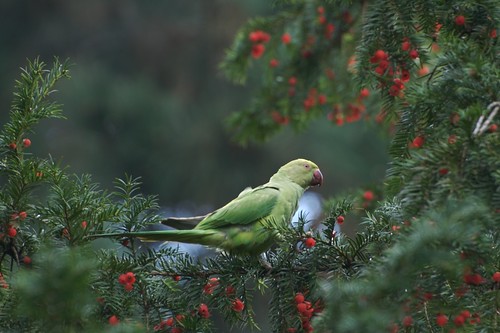The Parakeets Of Dusseldorf Ruffle City Feathers
 Friday, November 22, 2013 at 6:42
Friday, November 22, 2013 at 6:42  Ring-necked parakeet enjoying Yew-berries in a Düsseldorf park. Ulrich von PoblotzkiDUSSELDORF — The air is ice cold without a hint of wind. As night falls over Düsseldorf, they come flocking from all directions: thousands of ring-necked parakeets. They land on the plane trees that line the luxury Königsallee shopping street. Men in expensive suits and women in fur coats look up in amazement. A little girl tugs at her mother’s sleeve and says, “Mommy, they’re back.”
Ring-necked parakeet enjoying Yew-berries in a Düsseldorf park. Ulrich von PoblotzkiDUSSELDORF — The air is ice cold without a hint of wind. As night falls over Düsseldorf, they come flocking from all directions: thousands of ring-necked parakeets. They land on the plane trees that line the luxury Königsallee shopping street. Men in expensive suits and women in fur coats look up in amazement. A little girl tugs at her mother’s sleeve and says, “Mommy, they’re back.”
But not all Düsseldorf residents share the same sense of wonder at the exotic birds. Business owners on the upscale shopping street have come together to demand that the city authorities do something about the parakeets, which come every night from an area 25 kilometers wide to roost in the trees on the Königsallee.
Karl-Heinz Eiffler, the group’s leader, claims that they have nothing against the birds themselves, just their sheer numbers and the mess they leave behind. “In the morning, the street is covered with their droppings,” he complains. “The Königsallee is a luxury shopping street. The birds tarnish its image. If someone wearing a suit sits on a bench under the trees and gets a present from above, he’s not going to be happy.”
Eiffler and his colleagues have told the city authorities about the problem and they have reacted accordingly. Ten benches have been removed from the street. Now the bird droppings fall directly onto the pavement and passersby are only in danger as they walk under the trees. Eiffler is not impressed by this solution. “In winter nobody wants to sit outside anyway. But when it gets warmer people will want to, and then we’ll have the same problem.”
Tobias Krause, head of the city park authority, shrugs his shoulders. He says the benches are being cleaned, and then they’ll have to see about what to do next. He has no plans to do anything about the parakeets. They are simply there, and they have been there for some time.
Twenty years ago a breeding pair was brought over from India to the Rhineland, although nobody knows who brought them. “The birds are not on any kind of blacklist,” Krause says. “Soon everyone will get used to them. Some people find it hard to accept anything new, but nowadays no one knows that swans are not native to Germany, for example. They came from Eastern Europe.”
A bad rap
Ring-necked parakeets have just as many natural predators as other birds, and they do not take over breeding grounds, Krause emphasizes. They do not eat other birds and there have been no instances of shoppers being attacked by parakeets. The reality is that the parakeets simply perch in the trees, and the branches do not reach all the way across the street to the pavement by the shops, so customers are not in danger from droppings.
Krause himself is bold in the face of danger. He stands under the plane trees and points to the droppings on the pavement. “That’s from a jackdaw. And that’s from a crow.” It’s not as if the parakeets alone are responsible for the mess on the street.
Above all, Krause feels sorry for the birds. “They can only just survive here. It’s really too cold.” Every winter the population drops by many hundreds. Krause often finds birds with frozen feet. “Even just a little further north it’s too cold. They’d have no chance of surviving in Berlin. They can just about manage here in the Rhineland as it’s slightly warmer.”
In Bonn and Cologne there are a few thousand parakeets, but they roost in many different sites across the cities. No one knows why all the parakeets in the Düsseldorf region have decided to make their home on the Königsallee. “They like places where there is very little wind,” says Krause. “But you can find sites like that all over the city. And the Königsallee is no warmer than other places.”
Krause thinks the answer might be light. Unlike the city’s parks, the Königsallee is lit by streetlamps at night. “There are lots of falcons here that hunt parakeets. If it’s not completely dark, the parakeets can recognize the danger more quickly.”
The business owners on the Königsallee have caught wind of this possible explanation and developed a plan to drive away the parakeets. Karl-Heinz Eiffler tells us that they’re planning to switch off the streetlamps at night. It remains to be seen whether a blackout on the street will spell the end for the parakeets of the Königsallee.

